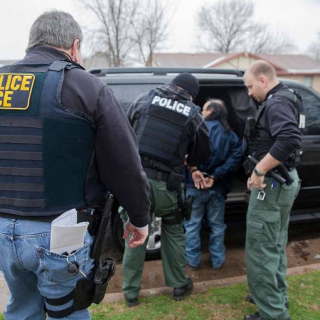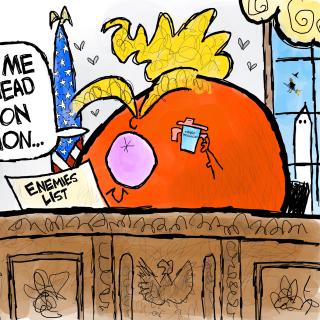Advertisement
Earlier this week on April 2, members of the Columbus branch of the National Association for the Advancement of Colored People (NAACP) woke up expecting to participate in a long-delayed election. By 9am they were supposed to receive an email link. A link that would allow them to cast votes, decide leadership, and carry forward an institution with more than a century of movement memory.
But the link never came.
For hours, there was silence. Confusion circulated through inboxes, group chats, and whispered phone calls. Had the election been delayed again? Was there a glitch? Had someone forgotten to hit “send?”
It wasn’t until nearly noon – three full hours after voting was scheduled to begin – when members received an email from the NAACP’s national office. The message, sent twice, contained a memo from Ericka Cain, Vice President of Governance, Compliance and Training. It explained that a court had issued a temporary restraining order, halting the election.
What it did not explain was that the judge’s order applied only to the race for branch president. And what it refused to address was why every other contest on the ballot had been canceled anyway – without warning, and without justification.
This wasn’t a clerical error. It was something deeper. Something structural.
The Columbus NAACP didn’t just postpone an election. It disrupted trust, broke silence, and exposed the growing disconnect between national leadership and the local communities it purports to serve.
And perhaps more than anything else, it raised a haunting, generational question: What does the NAACP stand for now?
The Fall and the Fight
The story begins in fall 2024, when attorney Sean Walton announced he would challenge longtime NAACP Columbus President Nana Watson for the top seat. Walton, a civil rights lawyer with local and national credentials, ran on a platform of transparency and reform. Watson, who had led the branch for nearly a decade, embodied institutional knowledge and traditional Black leadership.
Their election was scheduled for November. But when it came time to vote, the digital ballot opened for just five minutes – barely long enough to refresh a browser. Dozens of members were shut out. Protest followed. The vote was scrapped.
Weeks later, in January 2025, the national NAACP suspended Watson from her presidency and revoked her membership altogether. The allegations, outlined in a suspension letter, cited mismanagement of dues, miscommunication with state and national offices, and other procedural faults. Watson denies the charges and says she was given no opportunity to respond – no hearing, no process, no appeal that mattered.
So, she turned to the courts.
On March 29, Watson filed suit in Franklin County Common Pleas Court, arguing that the branch election – rescheduled for April 1 – should not proceed while her suspension appeal was pending. A judge agreed and issued a temporary restraining order to pause the presidential race. But again, it bears repeating: the order applied only to the office of branch president. Other uncontested races could still have taken place.
Instead, the NAACP shut everything down. Without notice. Without transparency. Without explanation.
A National Pattern
To see this in isolation is to miss the point.
In 2024, Roland Martin’s Unfiltered broadcast featured a string of suspended NAACP leaders – mostly longtime Black women, many of them respected elders – who claimed they were removed under similarly vague, procedural justifications. They spoke of retaliation, stonewalling, and a lack of transparency. They described a national office that seemed increasingly intolerant of internal critique.
This is not the first time a local president has been removed in silence.
And so, when members in Columbus read the memo on April 1, many felt it not as a shock, but as confirmation. Confirmation that the distance between national leadership and the community on the ground is widening. That authority may be consolidating upward. That dissent – even loyal dissent – is no longer welcome.
The Politics of Silence
What lingers most from that day is not the legal drama, but the silence.
Calls to the NAACP’s “Constituent Services” line were met with voicemail. Repeated messages left for Ericka Cain went unanswered. There was no press release. No leadership statement. Not even an FAQ.
Just a three-hour delay. A duplicate email. And a question that remains unanswered:
Why cancel an entire election when the court only blocked one race?
This silence becomes its own form of suppression. And in a city like Columbus – with its history of Black organizing, protest, and intellectual rigor – it feels like a betrayal.
A Question of Legacy
The NAACP has always carried a certain moral weight. It is not just a civil rights organization. It is a symbol—of resistance, of dignity, of Black endurance. Its chapters have fought battles the mainstream press forgot. Its members are often the first to show up and the last to leave.
But symbols, like institutions, are not above accountability.
When the NAACP fails to practice the very transparency it demands from public officials…
When it replicates the silence of systems it was designed to confront…
When it begins to treat its membership like subjects rather than stakeholders…
Then we are right to ask: What does it mean to belong?
I’m Writing This as a Member
This is not just an article. It is a report filed from inside the house.
I am a journalist. But I am also a NAACP member. I have paid dues. I have attended meetings. I believe in this institution. I believe in Black leadership, and I believe in our ability to repair what is broken.
But belief without truth becomes delusion. And truth without accountability becomes complicity.
So, I write this not in opposition to the NAACP – but in defense of its best self. I write this because silence cannot heal what transparency avoids. Because we do not just tell the good stories. We tell the hard ones, too.
It is not a betrayal to ask for better. It is a sign that we still care enough to try.
What’s Next?
The court hearing is scheduled for April 15. Whether the judge allows the branch to proceed with its elections – or rules in favor of a deeper intervention – remains to be seen.
But the real ruling will come not from the courtroom, but from the members.
Will they stay engaged?
Will national leadership respond with humility, not hubris?
Will Columbus remain a site of innovation, or become a cautionary tale?
We don’t know.
But as the soul singer once asked – softly, prophetically, urgently: “What’s going on?”
----------------------
DaVante’ Goins is an independent journalist and NAACP Columbus branch member who studied at Wittenberg University and Chief Executive Officer (CEO) & Founder at Kin Worldwide



